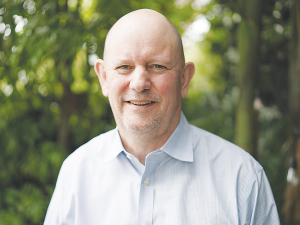Alliance commissions major heat pump system at Mataura, cutting coal use and emissions
Alliance Group has commissioned a new heat pump system at its Mataura processing plant in Southland.
 Centre for Climate Action director Wayne McNee says they are focused on scaling up efforts made to date by Kiwi farmers and agri-researcher.
Centre for Climate Action director Wayne McNee says they are focused on scaling up efforts made to date by Kiwi farmers and agri-researcher.
Farmers and the Government have jointly set up an investment fund to help the pastoral sector reduce emissions.
The Centre for Climate Action joint venture aims to help pasture-based farmers reduce their agricultural emissions by 30% by 2030.
As its first investment, the centre is pouring $1.8 million into Ruminant BioTech, a New Zealand- based start-up that is developing a slow-release, biodegradable methaneinhibiting bolus.
Initial trials are promising, indicating the bolus could deliver significant reductions in methane emissions from pasturebased farming, with trials indicating potential for reducing methane emissions by up to 70% for up to six months.
Centre executive director Wayne McNee notes that almost half of New Zealand’s greenhouse gas emissions come from agriculture, which makes up 75% of New Zealand’s goods exports.
“Since agriculture is the backbone of New Zealand’s economy, the importance of reducing methane emissions in agriculture cannot be understated.
“Our global customers are setting ambitious greenhouse gas reduction targets, and if we can’t meet these targets, export revenue that has underpinned our living standards will be under threat. We must confront this reality, and I believe we can meet the challenge.
“We’re focused on scaling up efforts made to date by Kiwi farmers and agri-researchers and forging ahead with investigating new opportunities and investments.
“We welcome interest from potential new shareholders, technology companies and strategic partners.”
Established in February, the centre is a worldfirst investment fund established between Government and major agribusiness companies to help pasture-based farmers in Aotearoa New Zealand reduce their agricultural emissions by 30% by 2030.
The joint venture’s role is to help take the pressure off New Zealand farmers by making sure that they have equitable access to affordable and effective tools and technology to cut their methane and nitrous oxide emissions, while maintaining efficiency, production and profitability.
The JV’s shareholders are ANZCO Foods, Fonterra, Rabobank, Ravensdown, Silver Fern Farms and Synlait, many of the largest players in New Zealand agribusiness owning 50%, with the other 50% owned by the Government through MPI.
The board is chaired by Sir Brian Roche and includes Jessie Chan, Sir Neville Jordan, Greg Murison and Fraser Whineray, who bring experience in agribusiness, agri-research and tech start-ups. McNee says the JV is focused on getting tools into farmers’ hands and brings together large agriculture players with expertise and capital in a way that’s never been seen before in New Zealand or anywhere else in the world.
“The JV’s shareholders have access to over 70% of New Zealand’s farms which will make it easier to accelerate the adoption of emissions reduction tools on farm.
“Our shareholders are committed to ensuring the JV is commercially led, informed by science, and investing in and developing practical tools to reduce agricultural emissions. We also recognise the importance of intergenerational stewardship of the land and the key role te ao Māori beliefs, values and aspirations will play in the success of the JV.
“The JV must be a problem solver and value creator. Our shareholders have invested in the JV because it is working to solve the emissions challenge for our pasture-based farmers, and because it has potential to be the world leader in commercialising emissions- reduction solutions for pasture-based farmers that can be sold in New Zealand and globally.”
Additional reductions to costs for forest owners in the Emissions Trading Scheme Registry (ETS) have been announced by the Government.
Animal welfare is of paramount importance to New Zealand's dairy industry, with consumers increasingly interested in how food is produced, not just the quality of the final product.
Agriculture and Forestry Minister Todd McClay is encouraging farmers and growers to stay up to date with weather warnings and seek support should they need it.
The closure of SH2 Waioweka Gorge could result in significant delays and additional costs for freight customers around the Upper North Island, says Transporting New Zealand.
OPINION: The year has started positively for New Zealand dairy farmers and things are likely to get better.
Ministry for Primary Industries (MPI) Director General Ray Smith believes there is potential for an increase in dairy farming in New Zealand.
OPINION: There will be no cows at Europe's largest agricultural show in Paris this year for the first time ever…
OPINION: Canterbury grows most of the country's wheat, barley and oat crops. But persistently low wheat prices, coupled with a…